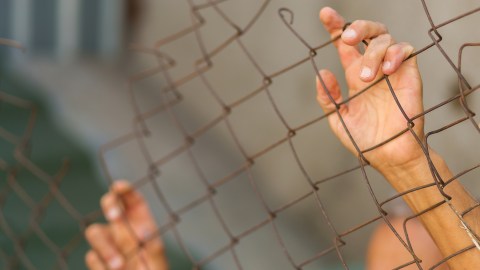What Even the Best Comprehensive Immigration Restrictions Overlook

Political debates in recent years have depicted immigration in increasingly distorted ways. Dominant fears of immigrants characterize are in conflict with verifiable statistics. Furthermore, the heated rhetoric surrounding the topic has obscured some fundamental ethical questions surrounding the topic that, when explicitly considered, permit anti-immigrant concerns to be assuaged with much less severe policies.
The political debates about immigration in recent years have obscured some of the more obvious facts about immigration – especially with respect to crime. As Professor Marie Gottschalk, who studies and teaches political science at the University of Pennsylvania, observes, American law enforcement and immigration enforcement agencies have converged in a costly way on empirically false premises since the Reagan administration and through the Obama administration. She notes, for instance, that while the average number of deportations grew from about 20,000-25,000 under Reagan to 400,000 under Obama, rises in crime due to legal and illegal immigration have been virtually non-existent: Professor Gottschalk cites data demonstrating that immigrant populations suppress crime rates in Gateway Cities and have no effect on crime rates in other cities. This is in direct contradistinction to politicized depictions of immigration as synonymous with waves of violent crimes.
In addition to Professor Gottschalk’s work, many scholars and journalists have worked to shed light on the plights of immigrants. For example, an episode of NPR’s program Embedded called “The Immigrant” examines the legal realities of cases of deportation as experienced by a family and a lawyer who works to try to keep the immigrant-father together with the rest of his family. Numerous such works illuminate deeper humanitarian concerns implicit to current practices of restricting immigration.
These overarching ethical concerns regarding the humanitarian issues surrounding immigration policies have been neglected. To remind us of the scope of these concerns, Professor Bryan Caplan, an economist at George Mason University, opens an accessible and meticulous essay on immigration policy with the following moral thought experiment:
Moved by the plight of desperate earthquake victims, you volunteer to work as a relief worker in Haiti. After two weeks, you’re ready to go home. Unfortunately, when you arrive at the airport, customs officials tell you that you’re forbidden to enter the United States. You go to the American consulate to demand an explanation. But the official response is simply, “The United States does not have to explain itself to you.”
You don’t have to be a libertarian to admit that this seems like a monstrous injustice. The entire ideological menagerie—liberals, conservatives, moderates, socialists, and libertarians—would defend your right to move from Haiti to the United States. What’s so bad about restricting your migration? Most obviously, because life in Haiti is terrible. If the American government denies you permission to return, you’ll live in dire poverty, die sooner, live under a brutal, corrupt regime, and be cut off from most of the people you want to associate with. Hunger, danger, oppression, isolation: condemning you to even one seems wrong. Which raises a serious question: if you had been born in Haiti, would denying you permission to enter the United States be any less wrong?
The power of this thought experiment can be summed up as follows. There are parts of the world from which to deny an American citizen re-entry would be tantamount to condemning her to a gruesome fate. If not clearly unjust, then arguing against re-entry citizen necessitates extraordinary explanation. To say that such a gesture is not unjust if applied to someone not native to America seems arbitrary. What we are left with, then, is a prima facie depiction of the humanitarian side of immigration: many people emigrate to flee dire straits. Intuitively, this is even truer when the immigrants risk extraordinary punitive measures by an ever-expanding security measures to immigrate enter America illegally.
Once immigration restrictions are situated within their humanitarian context, the policies that follow from anxieties regarding the effects of widespread immigration look very different. In his essay, Professor Caplan articulates many common arguments in favor of immigration restrictions and offers plausible alternative policies that would assuage the concerns raised while preserving the humanitarian benefits of less restricted borders. The first claim he considers is that restricting immigration protects American workers. Caplan argues that this claim turns out to be false: Americans benefit rather than suffer from the results of immigration. Nevertheless, Caplan offers the following alternative to restricting immigration to those still convinced that high rates of immigration hurt American workers:
There is a cheaper and more humane alternative: Charge immigrants surtaxes and/or admission fees, then use the extra revenue to compensate low-skilled Americans. For example, you could issue green cards to Haitians who agree to perpetually pay a 50 percent surtax on top of their ordinary U.S. tax liability. Haitians used to earning a dollar a day would jump at the opportunity, and the extra revenue could fund, say, tax cuts for low-income natives. Critics can tailor the details to fit the magnitude of the harm they believe immigrants inflict on native workers. Whatever the magnitude of this harm might be, extracting compensation is cheaper and more humane than forcing foreigners to languish in the Third World.
Professor Caplan argues that the matters of American workers can be addressed without resorting to outright restrictions to immigration. If one endorses immigration restrictions on the basis that they hurt American workers but agrees on the troubling humanitarian implications of not allowing people to immigrate, it is unclear how she could advocate for a policy more restrictive that what Caplan suggests.
One more of the many claims that Professor Caplan addresses is the notion that immigration restrictions are necessary to protecting American taxpayers – namely, the robustness of the American welfare state. This seems reasonable enough: if destitute migrants are able to settle in America, there could be a disproportionate number of people relying on welfare programs. And this could cause welfare programs to require surges in taxes for American citizens or less access to the benefits of those programs (or both!). After providing a nuanced argument for why this objection is also not a justified one, Caplan again is willing to concede the point and offers alternative solutions to restricting immigration that preserves humanitarian concerns:
Before you embrace immigration restrictions, you should still look for cheaper, more humane solutions. They’re not hard to find. The simplest is to freely admit immigrants, but make them permanently ineligible for benefits. “Net fiscal burden” is not a physical constant. It is a function of policy. If immigrants paid normal taxes and received zero benefits, their “net fiscal effect” would almost automatically be positive. If permanent ineligibility seems unfair, surely it is less unfair than refusing to admit immigrants in the first place. And there are many intermediate approaches. You could impose a waiting period: No benefits for 10 years. You could reduce or limit benefits: Half benefits for life, or double Medicare co-payments. You could set thresholds: Immigrants become eligible for benefits after their cumulative taxes exceed $100,000. Whether you love or loathe these proposals, they are certainly cheaper and more humane responses to the fiscal effects of immigration than the status quo.
Once again, Caplan demonstrates that once situated within the humanitarian context of immigration-issues, arguments in favor of restrictions have clear, ethically superior alternatives.
These humanitarian-based approaches to immigration could have ramifications for countries outside of America. In The New York Times, Amanda Taub reported that unfounded anti-immigrant sentiments formed an undercurrent through the passing of Brexit. How would Caplan’s framework characterize the ideas of proponents of Brexit or of Geert Wilders, a Dutch politician seeking to become prime minister who endorsed immigration restrictions as part of his platform? How would it contend with the views of German conservatives who have opposed Turkish immigration?
In the meantime, discrimination toward Turks in Germany has contributed to cultivating the heart of the German hip-hop scene, which is dominated by Turkish-German rappers—many of whom took inspiration from African-American artists. In the face of all these political controversies and crises, such songsprovide opportunities for joy and inspiration.





